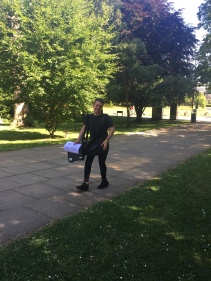A guest blog by Dr. Verona Ní Drisceoil, Lecturer in Law, Sussex Law School
The concept
The Virtual Land Law Field Trip Project, supported by an Innovation in Teaching Award, grew out of a desire to take land law students out of the lecture theatre and provide a space and platform within which to challenge and critique the subject of land law in practice. Through the use of a series of bespoke land law videos (on homelessness, access, housing crisis etc.), the aim is to provide a more visual and creative platform within which to engage students and to help support students in their spatial understanding of the subject of land law. The videos include different voices and spaces, and thereby provide an important space within which to  challenge themes of ‘alienation, exclusion, responsibility and power’ in the module of land law. In essence, the project is about setting a context (through the videos) within which key tensions underlying land law can be challenged and critiqued in lectures and seminars. The videos will be used as points within which to frame, and counter frame, discussion and encourage students to think about the social, economic, political and cultural contexts that shape land law’s role ‘in governing the use, allocation, acquisition and management of resources in the world we live in’ (Cowan, Fox O’ Mahony & Cobb, 2016:2).
challenge themes of ‘alienation, exclusion, responsibility and power’ in the module of land law. In essence, the project is about setting a context (through the videos) within which key tensions underlying land law can be challenged and critiqued in lectures and seminars. The videos will be used as points within which to frame, and counter frame, discussion and encourage students to think about the social, economic, political and cultural contexts that shape land law’s role ‘in governing the use, allocation, acquisition and management of resources in the world we live in’ (Cowan, Fox O’ Mahony & Cobb, 2016:2).
How the project will work?
The bespoke land law videos will run alongside the teaching of the module. The videos will be used in lectures, depending on the topics, and also as starting points for seminar discussion and debate. The video project will also feed into one of the essay titles in Assessment Block 1.
The added value, I hope!
Many students find the subject of land law difficult. It is dense and technical. Many students find it difficult to relate to the key principles and concepts not least because of complex language and terminology. It is hoped, therefore, that this land law project will help to break down some of those barriers, perceived or otherwise, and  offer a unique, creative and dynamic support for our students. Not only will the videos provide an innovative and creative form of dissemination but will provide a real insight into law in practice and, as stated above, help students to think about the societal, political and economic context within which the module is situated. The ‘Brighton’ focus within the videos offers a unique opportunity for students to think about ‘the governing use of allocation and acquisition of resources’ in a local context.
offer a unique, creative and dynamic support for our students. Not only will the videos provide an innovative and creative form of dissemination but will provide a real insight into law in practice and, as stated above, help students to think about the societal, political and economic context within which the module is situated. The ‘Brighton’ focus within the videos offers a unique opportunity for students to think about ‘the governing use of allocation and acquisition of resources’ in a local context.
Making the Videos
The process of making the videos for the module has been challenging and hugely time consuming but also deeply rewarding. It has been hugely rewarding to develop collaborative links across campus and beyond, develop my own technology skills and also to have the space within which to think critically about my role as teacher  and facilitator, particularly in the current political, economic and societal context. Do I need to do more to challenge the law? What can I do to facilitate deep learning? Does the land law curriculum merely serve the bourgeoisie?
and facilitator, particularly in the current political, economic and societal context. Do I need to do more to challenge the law? What can I do to facilitate deep learning? Does the land law curriculum merely serve the bourgeoisie?
Huge thanks go to Jamie Wyatt and Dominic Boos (current MA students) from the School of Media, Film and Music, who have worked with me on this project since November 2016 and took charge of the video shoots and editing. This collaboration, with Jamie and Dominic, has been a really positive experience and I think they have enjoyed it too.
Next steps
The project will be embedded into the teaching of the land law module this year (2017/18). Some work still needs to be done around how best to do this but I am nonetheless very excited about the year ahead. I look forward to seeing what works, and what doesn’t, and how this project will aid students in their deeper understanding of land law and the development of deeper critical thinking and engagement of, and in, the subject of land law.
If anyone would like to know more about the project, do please get in touch: V.Ni-Drisceoil@sussex.ac.uk.
At the end of 2017/18, I will be very happy to share with the Network how the project has been received!
Here’s hoping it will be a success!
Verona Ní Drisceoil July 2017
Many thanks to © Dominic Boos for the picture of the old pier and Hove huts.

